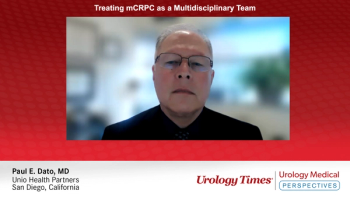Articles by Paul E. Dato, MD

Paul E. Dato, MD, discusses how bone-targeted therapies play an important supportive role in advanced prostate cancer, with recommendations for calcium and vitamin D supplementation, vitamin K2 consideration, resistance exercises, and regular monitoring for all patients on ADT.

Paul E. Dato, MD, discusses how treatment selection between triplet therapy, doublet therapy, or androgen deprivation monotherapy should be based on disease volume, risk factors, patient age, fitness for chemotherapy, and patient preferences through shared decision-making.

Paul E. Dato, MD, discusses how the absence of genetic alterations in the second case makes the patient ineligible for PARP inhibitor therapy until castration resistance develops, with focus remaining on ADT, AR-targeted therapy, chemotherapy, and bone support.

Paul E. Dato, MD, discusses how triplet therapy involving ADT, docetaxel chemotherapy, and an androgen receptor targeting agent would be the best treatment option for this patient with high-volume, high-risk symptomatic metastatic disease including hepatic involvement.

Paul E. Dato, MD, discusses how a 63-year-old Black man with recurrent hormone-sensitive prostate cancer (HSPC) presented with high-grade disease and multiple metastases after initial prostatectomy, requiring accurate staging and comprehensive treatment planning.

Paul E. Dato, MD, discusses how patient-specific factors such as age, tumor volume, comorbidities, and treatment adherence are critical for therapy selection, emphasizing the importance of assessing frailty rather than age alone and the value of multidisciplinary care.

Paul E. Dato, MD, discusses how the presence of a BRCA mutation can influence treatment selection and sequencing, supporting consideration of upfront triplet therapy intensification and planning for earlier integration of PARP inhibitors when castration resistance develops.

Paul E. Dato, MD, discusses how formulation and dosing differences between abiraterone options affect absorption and tolerability, with the micronized version potentially providing better compliance due to no fasting requirement, though insurance coverage remains a significant hurdle for its use.

Paul E. Dato, MD, discusses how when selecting abiraterone for metastatic hormone-sensitive prostate cancer patients, there are 3 formulations to consider: standard, generic, and micronized versions, with considerations for bioavailability, fasting requirements, and patient adherence.

Paul E. Dato, MD, discusses how a 69-year-old Black man presented with metastatic hormone-sensitive prostate cancer, showing symptoms of fatigue, nocturia, back pain, and weight loss, with initial treatment including androgen deprivation therapy and abiraterone acetate.

In the third article of this series, Paul E. Dato, MD, provides comprehensive insights on the multidisciplinary care of patients with metastatic castration-resistant prostate cancer.

In this installment, expert Paul E. Dato, MD, discusses the value of a multidisciplinary team in managing patients with mCRPC and considers how his institution ensures patients receive best available therapy.


